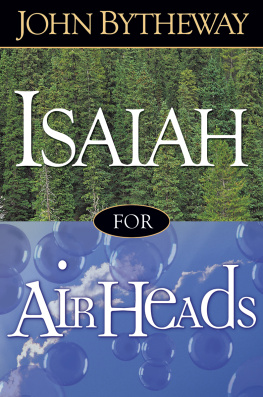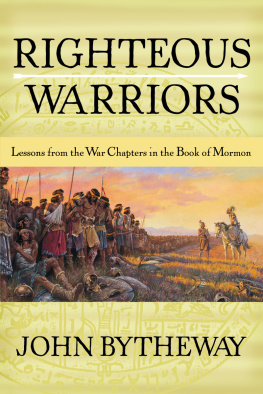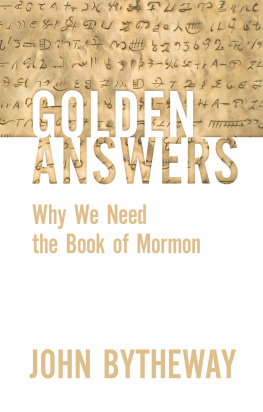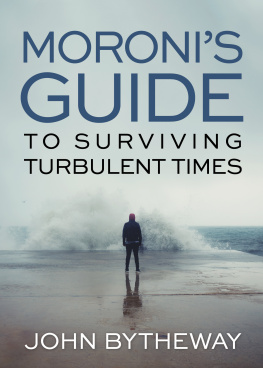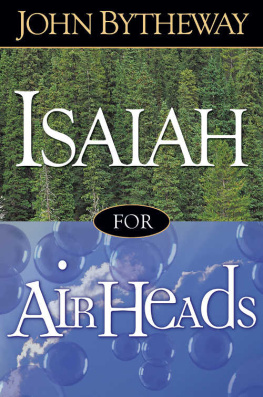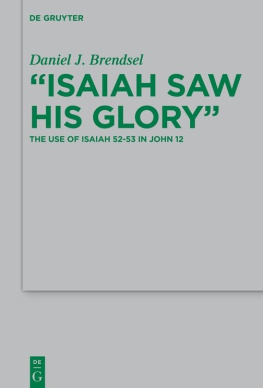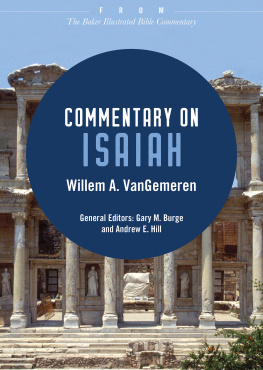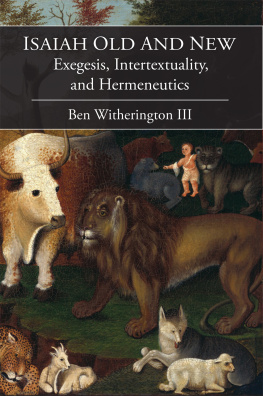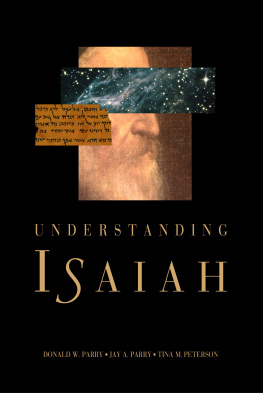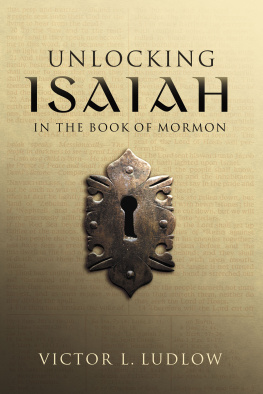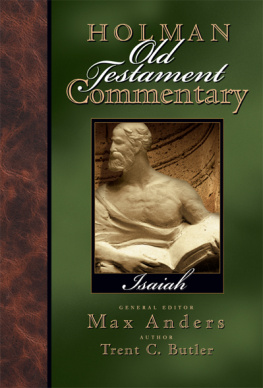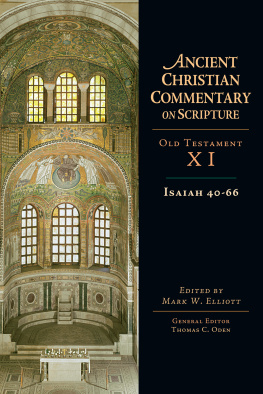Isaiah For Airheads
John Bytheway
2006 John Bytheway.
All rights reserved. No part of this book may be reproduced in any form or by any means without permission in writing from the publisher, Deseret Book Company, P.O. Box 30178, Salt Lake City Utah 30178. This work is not an official publication of The Church of Jesus Christ of Latter-day Saints. The views expressed herein are the responsibility of the author and do not necessarily represent the position of the Church or of Deseret Book. Deseret Book is a registered trademark of Deseret Book Company.
From Airhead to "A-ha!"
The Gospel Doctrine Disconnect
It's happened to all of us. We walk into Sunday School, and we see written on the blackboard: "Great are the words of Isaiah," and we think to ourselves, Oh, great... the words of Isaiah.
For many of us, the Isaiah chapters are just a barrier in the Book of Mormonsomething we have to "get through" to get to the rest. Only the Hebrew scholars get it and understand it. There's even an old joke about an LDS soldier whose life was saved because a Book of Mormon was in his shirt pocket. When asked how such a small book could stop a bullet, the soldier replied, "Heynothing gets through Second Nephi."
It's kind of a sad joke because we must get through Isaiah, and not just "get through it" but enjoy it, learn from it, and be blessed by it, because Jesus really did say "Great are the words of Isaiah." In fact, he said, "A commandment I give unto you that ye search these things diligently; for great are the words of Isaiah" (3 Nephi 23:1; emphasis added). So this becomes really serious because to search Isaiah is one of the Savior's commandments! And if we love the Lord, as we do, then we want to keep his commandments.
Who Do We Think We Are?
So our first step is to change our attituderather than just "getting through" Isaiah, let's "get from" Isaiah. Let's not get bogged down, let's get fired up! We don't need to be Hebrew scholarswe are sons and daughters of God with the gift of the Holy Ghost, for crying out loud! Scriptures are a gift from God, and children of God should never be intimidated by scripture. Isaiah is not a trial, it's a treasure! The fact that you're reading this book testifies that you're eager to understand Isaiah and your heart is already prepared.
This change in our attitude makes searching Isaiah a lot more fun. Isaiah is a treasure huntit's a challengeand there's a greater sense of satisfaction when you do a little detective work and can finally say, "Hey, I get this, I understand this!"
As we all know, when the Lord gives a commandment, he prepares a way. And you and I can have one of two reactions to the Lord's commandmentswe can echo Laman and Lemuel, "It is a hard thing you have required of us," or we can echo Nephi, "I will go and do..." (1 Nephi 3:57). Nephi brought these chapters to us at the peril of his life, and we'll probably have to answer to him and to the Lord if we just skip them.
Remember too that Jesus' book list is short. How many books has He actually commanded us to read? His book list is a lot shorter than Oprah's. He has not commanded us to see every movie, watch every game, or read every book on The New York Times bestseller list. His reading list is sorted by author, not by sales. Jesus said, "Man shall not live by bread alone, but by every word that proceedeth out of the mouth of God" (Matthew 4:4). The books he has commanded us to read and search were all written by God through his prophets.
"And they said of their instructor, Behold, his head is an empty void, and out of his ears leaketh much air"
As a new Book of Mormon instructor at BYU, when I got to the Isaiah chapters, I would just start with the first chapter and plow on through, explaining what I knew as I went. Sometimes students would ask thoughtful, serious, and wonderful questions. More often, after a particularly difficult Isaiah passage, they'd ask very pointed questions, like, "What does that mean?"
These students (or more likely their parents) paid tuition, and they wanted to know. C'mon "professor" Bytheway, what does that mean? (I'd quickly explain that I wasn't a professor, just an instructor, as if that would satisfy them.) At times, I felt like a complete airhead. And that's why I've entitled this book "Isaiah for Airheads," which is a commentary on my brain, not yours.
Sometimes, after our class discussion, my students would walk out the door muttering, "I'm still as confused as ever," to which I would reply, nodding wisely, "Yes, but now we're confused on a higher level and about more important things."
"Forest? What forest? I don't see a forest in here, just a bunch of trees..."
Later, I realized that this "plow-through-the-Isaiah-chapters" approach was like "missing the forest for the trees." We use that expression to describe someone who's so caught up in the details that they miss the larger picture. After teaching the Isaiah chapters a few times, I began to notice some prominent themes (this is one of the great benefits of teachingthe teacher often learns more than the student). I began to see the forest of Isaiah, and it was beautiful. I began to notice grand, important, and recurring themes that helped me better understand the words of this great prophet. I noticed what may have prompted the Book of Mormon prophets to quote Isaiah passages, and why. Now, after a decade of teaching, I look forward to these chapters, and I love watching my students experience "a-ha!" moments as we "get through" Second Nephi.
Now, a disclaimer. I wish that I could say, "After reading this book, you'll understand Isaiah." But that's not possible. Isaiah is not a freebieit's not a no-brainereven scholars disagree on the meaning of the things Isaiah said. Perhaps the Lord doesn't want it to be easy. Someone once said, "What we obtain too easily, we esteem too lightly." I suppose you've got to pay the price to obtain some blessings, but that's okay. We like blessings, and we're not afraid of work, as evidenced by the fact that we've turned off the TV and we're reading a book.
Scenic Byway Ahead...
Let's map out what we're going to do in the rest of this book: We're going to take a whirlwind tour through what we'll call, "Isaiah National Forest." How should we approach our visit to such an intimidating, expansive area?
Good question. Suppose we were to take a tour of a real forest, Yellowstone National Forest for example. As our bus takes the first "Scenic View" exit, how strange it would be for us to get out of the bus, run up to an individual tree, examine one or two of the leaves from a distance of two inches, then sprint back to the bus and tell the driver, "We're through hereScenic Pulloff #2, and step on it!"
Yet this is the way many of us experience Isaiah National Forest. We hear one or two passages in a class, mention one or two passages in a talk, without ever stopping to get the big picture. This kind of "drive by" scripture study never allows us to enjoy the view, to survey the landscape as a whole, or to see the colors and context of Isaiah National Forest.
So, before we get on the bus, we'll become acquainted with Isaiah's "Four Guides," "Four Trees," and "Four Keys." I'll also give you "Four Kingdoms" and "Four Events" to consider, which will give you a sense of the historical context in which these chapters were written. With these tools, we'll have all the equipment we'll need for our journey. Then, we'll take a broader look at each Isaiah chapter in the Book of Mormon and using our tools, we'll look for ways to understand them and apply them to our day.

